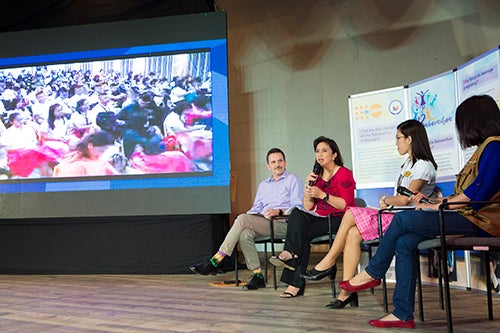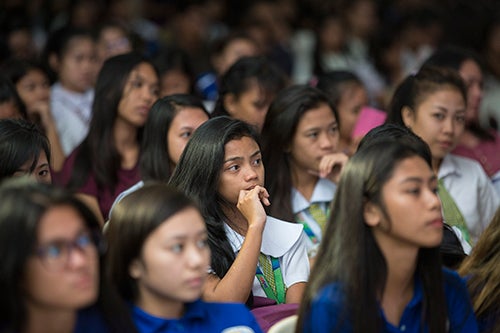Actualités
In the Philippines, information key to halting teenage pregnancy
- 23 Mars 2018
Actualités
ILOILO, Philippines – “I was shocked when I found out I was pregnant,” said Gina*, now 19. At the time, she was a third-year high school student in Iloilo, a central province of the Philippines, and already six months into the pregnancy.
“I’m happy and sad I gave birth because it’s been hard,” she told UNFPA. “I had to drop out of high school to find a job to support my family, like washing clothes,” she explained.
Gina is not alone in facing these challenges. In the Philippines, one in five girls is a mother by age 19, according to the National Demographic and Health Survey 2017.
Pregnancy often forces girls to leave school, jeopardizing their economic prospects and excluding them from other opportunities.

“And there are broader economic costs as well,” said UNFPA Country Representative Klaus Beck. “Every year, the Philippines forfeits around 33 pesos billion in lost income alone due to early pregnancy,” he added, referring to a 2016 UNFPA study.
“We really need more information on sex and reproductive health,” said Kathleen Acosta, 18, a senior at UP high school in Iloilo.
To take on this issue, UNFPA is working with the Office of the Vice President and three universities – Western Philippines University, Mindanao State University - Iligan Institute of Technology (MSU-IIT), and the University of the Philippines Visayas – to empower adolescent girls with age- and developmentally appropriate information on sexual and reproductive health.
The schools have committed to providing a variety of support, from conducting research to facilitating awareness-raising sessions in the community.
The partnership is a result of the Babaenihan Campaign, a call to action for the public and private sectors to invest in opportunities for adolescent girls. (Babaenihan, which combines the Tagalog words for “women” and “community spirit,” was initiated by UNFPA and the Office of the Vice President.)
“Schools empower girls and young women to reach their full potential. Western Philippines University commits itself to the Babaenihan call to action to empower marginalised adolescent girls through information and research,” said Western Philippines University President Elsa Manarpaac, during an event to mark the new partnership, held at the University of the Philippines Visayas in Iloilo.

“By raising their awareness on teenage pregnancy, we can help them become responsible and productive women. We strongly believe that educated girls can change the world,” Ms. Manarpaac told UNFPA.
Ms. Manarpaac was joined by Vice President Leni Robredo and UNFPA Representative Klaus Beck. MSU-IIT was connected via video conference.
"MSU-IIT is delighted and excited to be part of Babaenihan. The Institute is a strong advocate of young women's rights and is committed to continue its support for them through MSU-IIT's teen pregnancy prevention initiatives,” said Dr. Sukarno D. Tanngol, Chancellor of MSU-IIT.
An open forum was also held at the event, giving high school students the opportunity to ask the Vice President and Mr. Beck questions on gender equality and other issues.
“Let’s remember that women and girls have innate strength that grows even more when they get the love and support that they need from their community,” said Ms. Robredo.
Young people at MSU-IIT also participated via video link. This even enabled community members exposed to the crisis in Marawi to participate.
One internally displaced woman from Marawi asked what people can do to promote girls’ rights. In response, Mr. Beck spoke of the importance of working with community leaders to raise awareness of the harms of early pregnancy and child marriage.
Kathleen, the 18-year-old high school senior at UP high school, told UNFPA that information and empowerment are also key. “Many girls, including myself, have dreams that we want to achieve. I’ve always wanted to be a lawyer ever since I was a child, but to achieve these dreams we need to be equipped,” she said.
– Mario Villamor
*Name changed to protect privacy